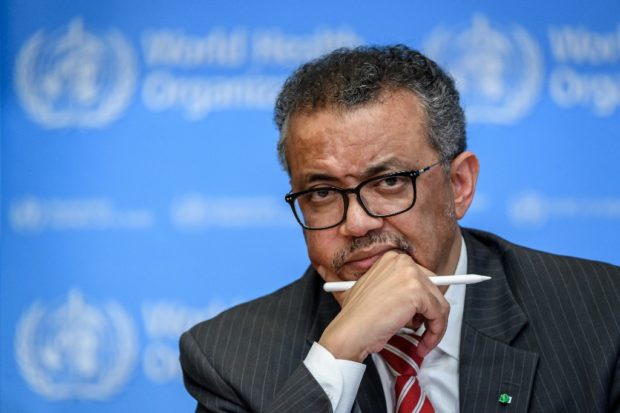
World Health Organization (WHO) Director-General Tedros Adhanom Ghebreyesus. (File photo / AFP)
GENEVA — World leaders rallied around the United Nations on Friday for an initiative to help the most vulnerable countries gain access to vaccines, diagnostics and treatment tools for the coronavirus as soon as they emerge.
The show of unity for the U.N. and the World Health Organization to speed up development and deployment of tools against the pandemic comes as the Trump administration has criticized the WHO’s response to the outbreak, and vowed to cut generous U.S. funding for it.
“This is a landmark collaboration to accelerate the development, production and equitable distribution of vaccines, diagnostics, and therapeutics for COVID-19,” said WHO Director-General Tedros Adhanom Ghebreyesus, hosting a parade of leaders by video conference. “Our shared commitment is to ensure all people have access to all the tools to defeat COVID-19.
Italian Premier Giuseppe Conte said Italy was “grateful” to the WHO, President Cyril Ramaphosa of South Africa praised Tedros’ “leadership” and Prime Minister Muhyiddin Yassin of Malaysia hailed the U.N. as among the “most powerful modalities” to meet challenges posed by the pandemic.
“We firmly believe that solidarity and multilateralism are the only way forward,” said Prime Minister Pedro Sanchez of Spain, which like Italy and France have been among the hardest-hit countries in Europe.
The novel coronavirus has infected millions of people and led to the deaths of more than 192,000, according to a tally by Johns Hopkins University on Friday.
A WHO document said the “Access to COVID-19 Tools”, or ACT, Accelerator aims to help develop tools “in record time and at record scale and access” to save millions of lives, trillions of dollars, and return to a sense of “normalcy” to the world.
Billed as a “landmark collaboration,” the effort aims to ensure the development, production and delivery of vaccines, therapeutics and diagnostics — when they are available — reach all countries no matter if big or small, rich or poor.
The project brings together governments, the U.N. and its partners, humanitarian aid groups as well as businesses and charities — notably the Bill and Melinda Gates Foundation.
U.N. Secretary-General Antonio Guterres said the effort to rid the world of COVID-19 “requires the most massive public health effort in history.”
“We are in the fight of our lives,” he said.
German Chancellor Angela Merkel pointed to an 8-billion euro funding gap for the COVID-19 vaccine program, and urged countries and the private sector to help close that.
British Foreign Secretary Dominic Raab, who has been sitting in for Prime Minister Boris Johnson as he recovers from the coronavirus, said that “it’s only through coming together and collective solutions that we’ll be able to defeat this virus. … That’s why the U.K. is proud to support the WHO call to action.”
Officials in the United States and China have pointed fingers at each other over the outbreak, denting international cooperation. President Donald Trump accused the WHO of not doing enough to call out China’s response as the outbreak emerged in Hubei province over four months ago.
“America’s world-leading scientists are working hard on a COVID-19 vaccine. We welcome serious efforts to assist in that endeavor, and look forward to learning more about the World Health Organization’s proposal,” the U.S. diplomatic mission in Geneva said in a statement. “We remain deeply concerned about the WHO’s effectiveness, given that its gross failures helped fuel the current pandemic.”
French President Emmanuel Macron, a key driver of the initiative, said he hoped the fight against COVID-19 will help reconcile China and the United States because “no division takes place” when it’s about “winning the battle.”
Macron urged leaders of the world’s biggest economies to “show the world that it’s possible to succeed when we are all together and unite our forces.”
He said the WHO initiative must rely on efficiently supporting medical systems across the world, making tests available including in the most fragile countries and investing more to develop treatments and vaccines.
Macron insisted that vaccines, when they are discovered, should be made accessible “as quickly as possible everywhere to all populations, including the most vulnerable.”